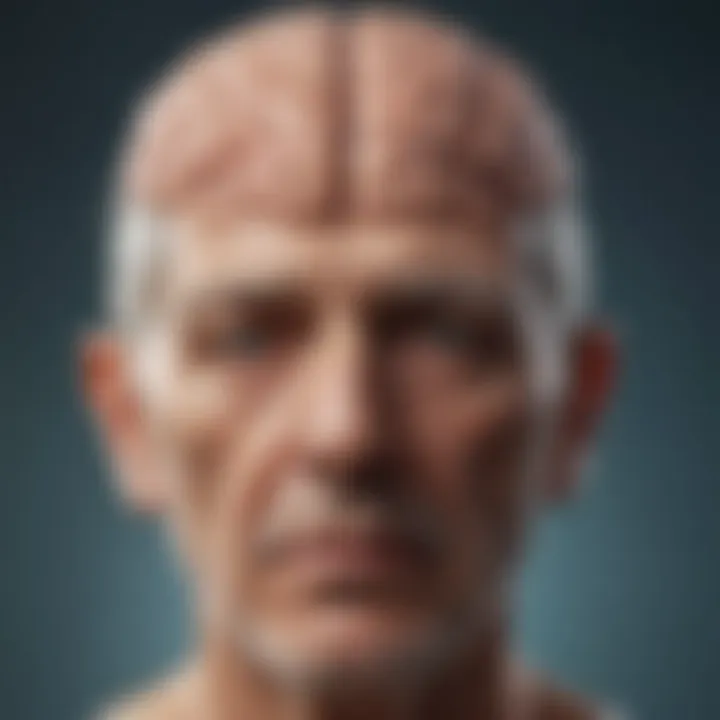Psychiatric Challenges in the Elderly: A Comprehensive Study


Intro
The elderly population is increasingly subject to a range of psychiatric problems, a trend that is on the rise with the aging demographic across many societies. As individuals grow older, various factors can contribute to the emergence of mental health conditions. These challenges include social isolation, physical health decline, and loss of loved ones. This article will explore key psychiatric problems faced by the elderly, such as depression, anxiety, and dementia. Understanding these issues is essential for healthcare providers, caregivers, and even family members who wish to offer effective support.
Research Overview
Summary of Key Findings
Research has shown that psychiatric issues in the elderly are not just isolated events but part of broader health concerns. Depression often presents itself with unique symptoms in older adults, differing from those observed in younger populations. For instance, symptoms like fatigue and loss of appetite may be mistaken for normal aging. Similarly, anxiety disorders are prevalent yet frequently undiagnosed in this age group due to overlapping symptoms with other medical conditions. Furthermore, dementia, particularly Alzheimer's disease, poses significant challenges, including a decline in cognitive function and the subsequent impact on daily living.
Background and Context
The prevalence of mental health issues in the elderly is a substantial global concern. Statistical data indicate that approximately 15 to 20 percent of older adults experience mental health disorders. Factors contributing to these numbers not only include biological changes associated with aging, but also psychosocial elements such as bereavement and living alone. A clear understanding of the background and context can guide effective intervention and treatment strategies in mental healthcare.
"Mental health is equally important as physical health among older adults; neglecting it leads to dire consequences."
Strategies for dealing with these issues must consider both the specific psychiatric conditions and their implications on the quality of life for the elderly. By integrating comprehensive assessments and treatments tailored to this population, healthcare will improve significantly.
Methodology
Experimental Design
This piece utilizes a secondary research approach, focusing primarily on peer-reviewed studies and systematic reviews related to psychiatric disorders in the elderly. The emphasis is placed on identifying patterns rather than conducting original experiments, as the aim is to synthesize existing knowledge.
Data Collection Techniques
Data were referred from authoritative sources, including journals, reputable healthcare organizations, and demographics studies, enriching the narrative with current findings. By analyzing trends and outcomes, we can better address psychiatric problems in the elderly.
Understanding psychiatric issues in the elderly demands an informed approach, both from the research community and healthcare practitioners. The combinations of data analysis, real-world implications, and compassionate care define the path forward.
Preamble to Psychiatric Problems in the Elderly
Understanding psychiatric problems in the elderly is crucial for multiple reasons. As populations age, mental health issues have become a significant area of concern. Many elderly individuals experience unique challenges. These can arise from both biological changes and psychosocial stressors that often accompany aging.
Psychiatric disorders like depression, anxiety, and dementia can severely affect not just the individuals but also the society as a whole. It impacts family dynamics, healthcare systems, and community resources. Therefore, awareness and comprehension of these disorders are vital for developing effective support mechanisms.
Improving mental health in older adults requires integrative approaches that consider their specific needs. Among these, access to appropriate healthcare and tailored interventions play an important role. Understanding the importance of mental well-being in this age group fosters a better quality of life. Consequently, addressing these issues early and effectively is essential.
Significance of Mental Health in Aging
The mental health of elderly individuals is an intricate part of overall health. Aging presents various transitions, such as retirement, loss of loved ones, and diminished social interactions. These life changes can lead to sadness, isolation, or anxiety.
Moreover, an older adult’s mental state can influence their physical health. Research indicates significant links between mental and physical health among the elderly. For example, depression can exacerbate chronic conditions, making management more difficult. Understanding and addressing mental health can lead to better outcomes in health care.
Patients who receive comprehensive mental health care often show improvements in quality of life. Ensuring elderly patients maintain connections with loved ones and healthcare providers can mitigate feelings of loneliness and detachment.
Historical Context
Historically, mental health in aged populations has often been overlooked. For much of the 20th century, psychiatric issues were viewed through a narrow lens, with mental illness sometimes seen as personal failures rather than medical conditions. Disturbingly, this led to stigmas. Many individuals faced institutionalization or inadequate care as a result.
In recent decades, there has been a shift towards more compassionate understandings of mental health. Research has expanded to include the elderly as a distinct population needing tailored approaches. Today, there is a recognized need to address mental illness in the context of aging proactively.
As we move forward, it is essential to educate healthcare professionals and the public. The comprehension of mental health issues in older adults has evolved. Considering this, an informed perspective can lead to enhanced care strategies and community support systems.
Prevalence of Psychiatric Disorders in the Elderly
Understanding the prevalence of psychiatric disorders in the elderly is crucial for several reasons. First, it highlights the significance of mental health in a population that often faces various age-related challenges. This knowledge assists healthcare providers in recognizing the extent of the issue and enables them to implement effective intervention strategies. Moreover, by evaluating the scope of these disorders, we can gain insight into the necessary resources and support systems required to improve mental health outcomes for older adults.
Statistical Overview
Elderly individuals are not immune to psychiatric disorders. Recent research indicates that approximately 20% of adults aged 65 and older experience some form of mental health challenge. The most common disorders include depression, anxiety, and cognitive impairments such as dementia. These statistics reveal that mental health issues in this demographic are prevalent and should not be viewed as a normal aspect of aging.
A study conducted by the World Health Organization shows that about 7% of elderly individuals suffer from major depressive disorder, while anxiety disorders affect around 10%. Furthermore, Alzheimer’s disease and other forms of dementia are seen in nearly 50% of individuals aged 85 and older. These figures underscore the need for increased awareness and proactive measures in treating psychiatric conditions in the elderly.
Demographic Variations
Demographic factors significantly influence the prevalence of psychiatric disorders among older adults. Age, gender, and cultural background play essential roles in shaping mental health outcomes. For instance, studies suggest that women are more likely than men to experience depression and anxiety as they age. This disparity may stem from factors such as social support networks and the prevalence of caregiving roles among older women.
Moreover, cultural background can affect perceptions of mental health and willingness to seek help. In certain communities, there may be a stigma attached to mental illness, leading to underreporting and inadequate treatment. Additionally, socioeconomic status affects access to mental health services, which can further exacerbate the prevalence of disorders.
In summary, the exploration of demographic variations highlights the complexity of mental health in older adults. It is essential for researchers and healthcare providers to consider these factors to tailor effective interventions and promote better mental health outcomes across diverse populations.
"Mental health conditions are common among older adults, yet they often go unrecognized and untreated."
For further reading, visit Wikipedia for more insights on this topic.
Common Psychiatric Disorders in the Elderly


Understanding common psychiatric disorders among the elderly is crucial for several reasons. First, the aging population is increasing globally, leading to a higher demand for mental health services. Recognizing these disorders early can significantly influence the quality of life for older adults. Furthermore, symptoms of psychiatric disorders may overlap with normal aging processes, making diagnosis complicated. Therefore, a comprehensive grasp of these issues is fundamental for healthcare providers, caregivers, and families.
Depression in Older Adults
Depression is one of the most prevalent psychiatric conditions in older adults. It often goes undiagnosed and untreated due to misconceptions that depression is a normal part of aging. Contrary to this belief, depression is not a natural state and should be addressed actively.
Symptoms might include a persistent feeling of sadness, loss of interest in activities once enjoyed, changes in sleep or appetite, and even suicidal thoughts. These symptoms can be devastating, affecting daily functioning and relationships. The World Health Organization (WHO) estimates that depression affects about 7% of the elderly population.
Several factors contribute to depression in this demographic. Loss of loved ones, chronic illnesses, financial stress, and social isolation can all exacerbate symptoms. Treatment options include medication, such as selective serotonin reuptake inhibitors (SSRIs), and therapeutic approaches like cognitive-behavioral therapy. It is essential for caregivers and health professionals to be vigilant and provide the necessary support to obtain effective treatment.
Anxiety Disorders
Anxiety disorders are another significant concern for older adults. These can manifest as generalized anxiety disorder, panic disorder, or specific phobias. Symptoms may include excessive worry, restlessness, fatigue, and difficulty concentrating. Such experiences can be particularly distressing for the elderly, impacting their daily lives.
Aging can bring about numerous stressors, including health-related fears, loss of independence, and changes in living situations. Chronic health conditions can also heighten anxiety levels. Effective management often involves a combination of medication and therapeutic strategies tailored to the individual. Recognizing and addressing these disorders is vital for improving mental health outcomes in the elderly.
Dementia and Related Disorders
Dementia presents a unique set of challenges for older adults and their families. It encompasses various disorders, including Alzheimer’s disease. Symptoms often involve memory loss, difficulty in communication, and behavioral changes. Dementia profoundly impacts the independence of individuals, leading to increased care needs.
The progression of dementia is gradual, and early diagnosis can be beneficial. Treatment mainly focuses on improving quality of life and may include medications like cholinesterase inhibitors. Moreover, support systems for caregivers are crucial, considering the emotional and physical demands of caring for someone with dementia.
Substance Use Disorders
Substance use disorders are a growing concern within the elderly population. With multiple medications prescribed for various health issues, the risk of misuse increases. Older adults may misuse prescription medications, alcohol, or over-the-counter drugs. Signs of substance abuse can be subtle and may include changes in mood or behavior, neglect of responsibilities, and social withdrawal.
Older adults might turn to substances as a coping mechanism for loneliness, grief, or pain from chronic illnesses. Educating both the elderly and their caregivers about the risks of substance use is important. Interventions could involve counseling and support groups, aiming to address both the mental and physical facets of substance use.
Causes and Risk Factors
Understanding the causes and risk factors of psychiatric problems in the elderly is essential. This segment sheds light on how various biological, psychosocial, and health-related issues contribute to mental health challenges in senior populations. Identifying these factors can lead to better care strategies, as healthcare providers can tailor interventions to the individual needs of older adults.
Biological Influences
Biological factors play a significant role in the mental health of elderly individuals. Aging itself affects brain structure and function, making older adults more vulnerable to certain psychiatric disorders. Changes in neurotransmitter systems can cause shifts in mood and behavior. Furthermore, genetic predispositions may increase susceptibility to conditions like depression and anxiety.
Neurodegenerative diseases such as Alzheimer’s and Parkinson’s also stand as prominent biological factors. These diseases not only lead to cognitive decline but can also produce behavioral changes that complicate mental health. The elderly often experience multiple health issues simultaneously, such as heart disease or diabetes, leading to complex interactions that exacerbate psychiatric symptoms.
Psychosocial Stressors
Psychosocial stressors significantly impact the mental health of older adults. Life transitions often emerge in later years, including retirement, loss of loved ones, or increased dependency on caregivers. Such changes can invoke feelings of isolation, sadness, or anxiety. The stress of adapting to new living situations or coping with bereavement can drive mental health decline.
In addition to personal losses, societal factors contribute to this stress. Ageism, in particular, can marginalize older adults, leading to feelings of being undervalued or ignored. Community support networks often shrink as one ages, which contributes to loneliness. Couple this with potential financial constraints, many elderly individuals face everyday pressures that can lead to overwhelming psychological distress.
Chronic Health Conditions
Chronic health conditions stand as formidable risk factors for psychiatric problems in the elderly. The presence of ongoing physical ailments can severely hampered quality of life, leading to mental health dilemmas. Conditions such as arthritis, heart disease, or chronic pain syndromes often limit mobility, thereby reducing opportunities for social interaction and engaging in meaningful activities.
Furthermore, chronic illness can bring about a cycle of helplessness and despair. As one grapples with constant discomfort or disability, the motivation for self-care may diminish, fostering an environment ripe for depression and anxiety. Regular medication regimens for these conditions can also complicate mental health, as side effects may include mood alterations.
The interplay of biological, psychosocial, and chronic health factors emphasizes the need for a comprehensive approach to mental health treatment in the elderly. Understanding these determinants guides the development of more appropriate interventions.
Impact on Quality of Life
The impact of psychiatric disorders on the elderly population extends well beyond the individual experiencing these conditions. It encompasses profound effects on their quality of life, which in turn affects families, caregivers, and society at large. Understanding these impacts is crucial for developing effective interventions and ensuring that older adults can maintain a satisfying life in their later years. Key factors include functional limitations, social isolation, and economic burdens.
Functional Limitations
Functional limitations refer to difficulties in carrying out daily activities that older adults often face due to psychiatric disorders. Conditions like depression can lead to fatigue and lack of motivation, making even simple tasks challenging. Assessing these limitations is essential for caregivers and healthcare providers so that appropriate support can be arranged.
Some common functional limitations include:
- Difficulty in performing routine tasks such as personal hygiene and cooking.
- Reduced mobility caused by anxiety or fear, affecting physical health.
- Challenges in managing medications or attending medical appointments due to cognitive decline.
Addressing functional limitations involves a multi-faceted approach that combines medication, therapy, and support from family or community resources. Better functional ability translates to a higher quality of life and more independence for older adults.
Social Isolation
Social isolation is another significant concern linked to psychiatric disorders in the elderly. Seniors experiencing depression or anxiety may withdraw from social interactions, leading to feelings of loneliness. This isolation influences mental health, potentially intensifying the existing disorders.
To combat social isolation, it is important to encourage social engagement, which can take many forms:
- Participation in community activities or clubs designed for seniors.
- Regular visits from family and friends, fostering connection.
- Involvement in technology, such as video calls, to maintain long-distance relationships.
Measures to reduce social isolation can greatly enhance the emotional well-being and overall quality of life for older adults.
Economic Burden
The economic burden of psychiatric disorders in older adults is substantial, affecting not only the individuals but also families and healthcare systems. Increased healthcare costs arise from treating both the psychiatric issues and the associated physical health conditions.


Factors contributing to the economic burden include:
- Higher medical expenses due to frequent doctor visits and possible hospitalization.
- Loss of income, if the elderly individual can no longer work or if caregivers must take time off work.
- Costs of caregiving and long-term care facilities when support becomes necessary.
Understanding these economic challenges is vital for policymakers. They must consider strategies to alleviate these burdens through improved support systems and accessible mental health care services.
"A clearer understanding of the impacts psychiatric disorders have on the elderly can help illuminate the path toward effective interventions and improved quality of life."
Diagnosis of Psychiatric Disorders in Older Adults
Diagnosis of psychiatric disorders in older adults is a crucial part of understanding and addressing mental health issues in this population. As mental health conditions can significantly affect the overall well-being of elderly individuals, accurate diagnosis leads to effective treatment plans. With numerous factors contributing to psychiatric problems, including age-related changes, resilience, and life experiences, the need for precise assessment becomes evident.
Proper diagnosis is important for several reasons:
- Timely Intervention: Early diagnosis allows for quicker initiation of treatment, which can prevent the worsening of symptoms.
- Personalized Care: Understanding specific diagnoses helps healthcare providers tailor interventions to meet the unique needs of each individual.
- Resource Allocation: Accurate assessment ensures that healthcare resources are efficiently utilized, focusing on patients who truly need assistance.
- Improved Quality of Life: Effective management of psychiatric disorders can enhance the quality of life, allowing older adults to engage more actively in their communities and relationships.
Given these aspects, the focus on diagnostic processes may help in mitigating the stigma often associated with mental health issues in older people. Also, it can empower caregivers with knowledge that fosters empathetic support.
Clinical Assessments
Clinical assessments are the cornerstone of diagnosing psychiatric disorders in older adults. These assessments typically involve a combination of interviews, medical histories, and structured questionnaires. Healthcare professionals, such as geriatric psychologists or psychiatrists, perform them to gather comprehensive information about an individual's mental health.
Elements of clinical assessments may include:
- Comprehensive Interview: This helps practitioners understand the patient's symptoms, personal history, and social context. It often includes inquiries about mood, behavior changes, and cognitive functioning.
- Physical Examination: A physical exam establishes whether there are underlying health issues contributing to mental health symptoms. For example, conditions such as thyroid disorders can mimic depression.
- Cognitive Testing: Tools like the Mini-Mental State Examination assess cognitive function and distinguish between normal aging and conditions like dementia.
Standardized Screening Tools
Standardized screening tools are important for capturing the presence and severity of psychiatric disorders in older adults. These tools provide a systematic way to measure symptoms and ensure consistency across different assessments. Using validated instruments can enhance diagnostic accuracy.
Common standardized tools include:
- Beck Depression Inventory: This measures the severity of depression, helping clinicians identify changes over time.
- General Anxiety Disorder 7-item scale (GAD-7): It assesses anxiety levels and guides clinical decisions accordingly.
- Patient Health Questionnaire-9 (PHQ-9): This questionnaire aids in diagnosing and understanding the impact of depressive episodes on daily functioning.
Utilizing these tools can facilitate early identification of issues that may otherwise go unnoticed, especially in the elderly who may have difficulties articulating their feelings. Ultimately, integrating both clinical assessments and standardized screenings paves the way for more precise and effective management of psychiatric disorders in the elderly.
Treatment Options
Understanding treatment options is essential in addressing the psychiatric issues faced by the elderly. This population is unique, with their own set of challenges and needs. Appropriate treatment can significantly improve mental health outcomes and enhance the quality of life. Various approaches exist, and each has its advantages and considerations.
Pharmacological Interventions
Pharmacological interventions play a crucial role in managing psychiatric disorders in older adults. Many medications exist to address conditions like depression, anxiety, and psychosis. The effectiveness of these medications can vary among individuals due to differences in biology, age, and overall health.
Key considerations:
- Dosing: Lower doses are often necessary for older adults, considering their sensitivity to medications.
- Side Effects: Older patients may experience more severe side effects, such as dizziness, confusion, or falls.
- Drug Interactions: Many elderly patients take multiple prescriptions for various health issues. Attention to interactions among drugs is vital.
It is imperative to tailor pharmacological treatments to the individual, keeping in mind their full medical history.
Common types of medications include:
- Antidepressants: Selective serotonin reuptake inhibitors (SSRIs) are frequently prescribed.
- Anxiolytics: These are often used to treat anxiety disorders but must be monitored closely.
- Antipsychotics: These may be needed for severe cases of psychosis or behavioral challenges.
Psychotherapy Approaches
Psychotherapy offers important benefits for older adults experiencing psychiatric problems. It can complement pharmacological treatments and help patients manage their symptoms more effectively. Several psychotherapy approaches are adapted specifically for older populations:
- Cognitive Behavioral Therapy (CBT): This method focuses on changing negative thought patterns and behaviors, making it effective for depression and anxiety.
- Reality Therapy: This approach helps patients cope with issues related to aging and loss of autonomy.
- Group Therapy: Participating in group therapy can provide social support and reduce feelings of isolation.
Advantages of psychotherapy:
- Empowerment: It supports individuals in understanding their conditions and enhances coping strategies.
- Non-Invasive: Unlike medications, psychotherapy does not have systemic side effects.
- Long-Term Skills: Patients can learn skills that may serve them throughout life.
Alternative and Complementary Therapies
With the rise of interest in holistic care, alternative and complementary therapies are gaining traction in the treatment of psychiatric disorders in the elderly. These options can be used alongside conventional treatments and may address specific individual concerns. Common therapies include:
- Mindfulness and Meditation: Practices that foster present-moment awareness can reduce symptoms of anxiety and depression.
- Exercise Therapy: Regular physical activity is proven to boost mood and overall mental health.
- Herbal Supplements: Herbs like St. John's Wort or ginkgo biloba are sometimes considered but should be used with caution due to potential interactions with medications.
These therapies may provide significant benefits, including:
- Reduced Stress Levels: Many of these methods help decrease stress and anxiety.
- Enhanced Well-Being: Addressing both mind and body can uplift overall well-being.
- Personal Empowerment: Allowing individuals to take control of their own healing process.
Challenges in Treatment and Care
The treatment of psychiatric problems in the elderly presents unique challenges that cannot be overlooked. As this population grows, understanding these difficulties becomes essential. Addressing mental health in older adults forms a critical aspect of their overall healthcare. Failure to recognize the issues can lead to aggravated symptoms, reduced quality of life, and increased healthcare costs. Thus, understanding the challenges in treatment and care is paramount for both health providers and caregivers alike.


Barriers to Access
Barriers to accessing mental health services for the elderly might arise from several sources. One primary barrier is the lack of availability of specialized services. Many areas may not have enough mental health professionals trained to work with older adults.
Additionally, mobility issues can further hinder access. For instance, a person who has difficulty walking may find it hard to reach a healthcare facility. Transportation problems compound this difficulty.
Cost can be another obstacle. Many elderly people live on a fixed income, and they may not be able to afford additional healthcare services. Even with insurance, high copays and uncovered services can be a deterrent.
Moreover, a lack of awareness regarding available services often exists among both patients and caregivers. This void leads to underutilization of available resources. It is vital for communities to advocate for better access to mental health services, including telehealth options that can help bridge this gap.
Stigma and Misunderstanding
Stigma surrounding mental health issues remains a significant challenge. Negative stereotypes about mental illness can discourage older adults from seeking help. They may fear being judged or misunderstood by their peers and families. This stigma often leads to isolation and a reluctance to discuss mental health issues openly.
Misunderstanding of psychiatric disorders among family members can exacerbate the situation. Family may dismiss symptoms as mere signs of aging rather than recognizing them as potential mental health issues. If not identified, conditions like depression or anxiety can worsen.
Efforts to reduce stigma within communities are essential. Educating families and caregivers about psychiatric disorders in the elderly can foster more supportive environments. Understanding psychiatric concerns should be seen as an integral part of caring for older adults, rather than a separate aspect.
"Mental health awareness is critical, especially in older populations where stigma can prevent necessary treatment."
Combining efforts to enhance access to care and reduce stigma can create an environment where elderly individuals feel more supported. Understanding these challenges is not simply an academic exercise—it impacts real lives. Engaging with these issues can lead to positive outcomes for both the elderly individuals and their caregivers.
Role of Caregivers
The role of caregivers is vital in managing psychiatric problems in the elderly population. Caregivers often serve as the primary support system for older adults facing various mental health challenges. They not only provide daily assistance but also advocate for the mental well-being of these individuals. By understanding the complexities of psychiatric conditions, caregivers can make significant contributions to the treatment process and enhance overall quality of life.
Caregivers face unique challenges. They must balance their own needs while ensuring that the emotional and mental health needs of the elderly are met. The support they provide can reduce feelings of isolation often experienced by older adults struggling with mental health issues. A robust caregiving relationship can help in monitoring signs of depression, anxiety, and other disorders, allowing for timely intervention.
Support for Mental Health
Supporting mental health involves various strategies. Caregivers should prioritize creating an environment that fosters open communication. This involves encouraging elderly individuals to express their feelings without fear of judgment. Regularly engaging them in discussions can help in identifying any shifts in their mental health status. Some effective support strategies include:
- Active Listening: A caregiver should be attentive to the concerns and experiences of the elderly.
- Routine Activities: Structuring daily routines can give a sense of predictability.
- Social Engagement: Facilitate connections with family members, friends, or community groups.
- Healthy Lifestyle: Encourage activities such as physical exercise or hobbies that may improve mood and wellbeing.
Caretakers should also be educated on optimal coping strategies to manage stress. They can attend caregiver support groups or mental health workshops to enhance their skills. A strong support network is beneficial not only for the elderly but for the caregivers themselves.
Navigating Healthcare Systems
Navigating healthcare systems can be a daunting task for caregivers of the elderly, especially when psychiatric care is involved. Understanding how mental health services function is crucial for effective care management.
Caregivers must learn about various resources available in their communities. This can include:
- Mental Health Professionals: Identifying therapists, psychiatrists, or counseling services that specialize in geriatric care.
- Local Support Groups: Connecting with others who share similar experiences can provide valuable insights and support.
- Legal and Financial Assistance: Understanding the ins and outs of insurance coverage or government aid can alleviate some of the burden.
"Being an effective caregiver requires knowledge and resources, not just empathy."
Proactive measures such as attending health seminars or visiting educational websites can prepare caregivers effectively. Empowering caregivers in this manner enriches their ability to serve the elderly population struggling with mental health issues.
Future Directions in Research
Addressing psychiatric problems in the elderly is both essential and pressing. As the population ages, understanding the nuances of mental health care for older adults becomes crucial. Research in this area holds the potential to uncover innovative treatment approaches as well as enhance our understanding of mental health in geriatric populations. This section will discuss emerging trends in treatment and the implications of longitudinal studies.
Emerging Trends in Treatment
Recent developments in psychiatric treatment present several encouraging trends. One notable trend includes the increased use of digital health technologies. Telepsychiatry, for instance, allows patients to access mental health care from their homes, benefiting those with mobility issues or those living in remote areas. This form of treatment can reduce barriers, providing more immediate and accessible care.
In addition, there is a growing emphasis on personalized medicine. Tailoring treatment plans based on individual needs and genetic profiles can enhance effectiveness. For instance, the growing interest in pharmacogenomics explores how genetic variations affect individual responses to psychiatric medications.
Other emerging trends include:
- Integrative approaches: Incorporating lifestyle changes, nutrition, and mind-body techniques into treatment plans.
- Collaborative care models: Encouraging cooperation between primary care providers and mental health specialists to treat the whole patient.
- Mindfulness and cognitive behavioral therapies: These techniques are gaining traction due to their ability to empower patients and equip them with coping strategies.
Longitudinal Studies and Their Implications
Longitudinal studies offer valuable insights into the progression of psychiatric disorders among the elderly. These studies track individuals over extended periods, providing data that can identify patterns and long-term effects of mental health conditions. Understanding how various factors, like physical health, social connections, and changes in environment, contribute to mental health outcomes is vital.
Such studies help isolate the effects of treatment and can inform best practices for interventions. For example, they can indicate whether specific therapies, lifestyle changes, or medications are effective over time. Moreover, the results can guide policy changes, such as resource allocation for mental health services tailored to older adults.
"Longitudinal research provides a robust framework for understanding the complexities of aging and mental health, revealing pathways for improvement in care and treatment."
Concluding Remarks
In concluding our exploration of psychiatric problems in the elderly, it is essential to recognize the complexity and multifaceted nature of this subject. The aging population faces unique mental health challenges, often exacerbated by various factors such as biological changes, chronic health conditions, and social circumstances. The importance of focusing on these issues lies not only in understanding the prevalence of disorders like depression and anxiety but also in addressing the broader implications for individuals, families, and society as a whole.
One key element highlighted throughout the article is the profound impact that psychiatric disorders can have on quality of life. Older adults with mental health issues may experience significant functional limitations, leading to difficulties in performing daily activities. Social isolation is another critical concern, as these conditions can create barriers to meaningful social interactions and support systems. Addressing mental health in the elderly is thus essential for promoting independence and enhancing overall well-being.
Furthermore, our discussion has brought attention to the role of caregivers and healthcare providers in navigating the complexities of mental health care. Support for mental health is not merely about clinical treatment; it also encompasses emotional support, education, and resources for caregivers. This ensures that both the elderly individuals and their caregivers are equipped to handle the challenges that arise.
Turning to the future, research into the psychiatric problems facing older adults is vital. With an aging population, emerging trends in treatment need to be investigated. Longitudinal studies are particularly significant as they provide a deeper understanding of how psychiatric disorders evolve over time and how interventions can be effectively tailored.
In summary, the insights offered in this article underscore the necessity for a comprehensive approach to elderly mental health. As we better understand the nuances of psychiatric problems in this demographic, we can develop targeted strategies that aim at reducing stigma, improving access to care, and ultimately enhancing the quality of life for older adults. This endeavor is not only crucial for individuals but also beneficial for society at large.
"Prioritizing mental health in the elderly can lead to improved life satisfaction and decreased healthcare costs."
By bringing awareness to these issues, we can foster a more informed and empathetic society, capable of addressing the complex needs of our elderly population.







